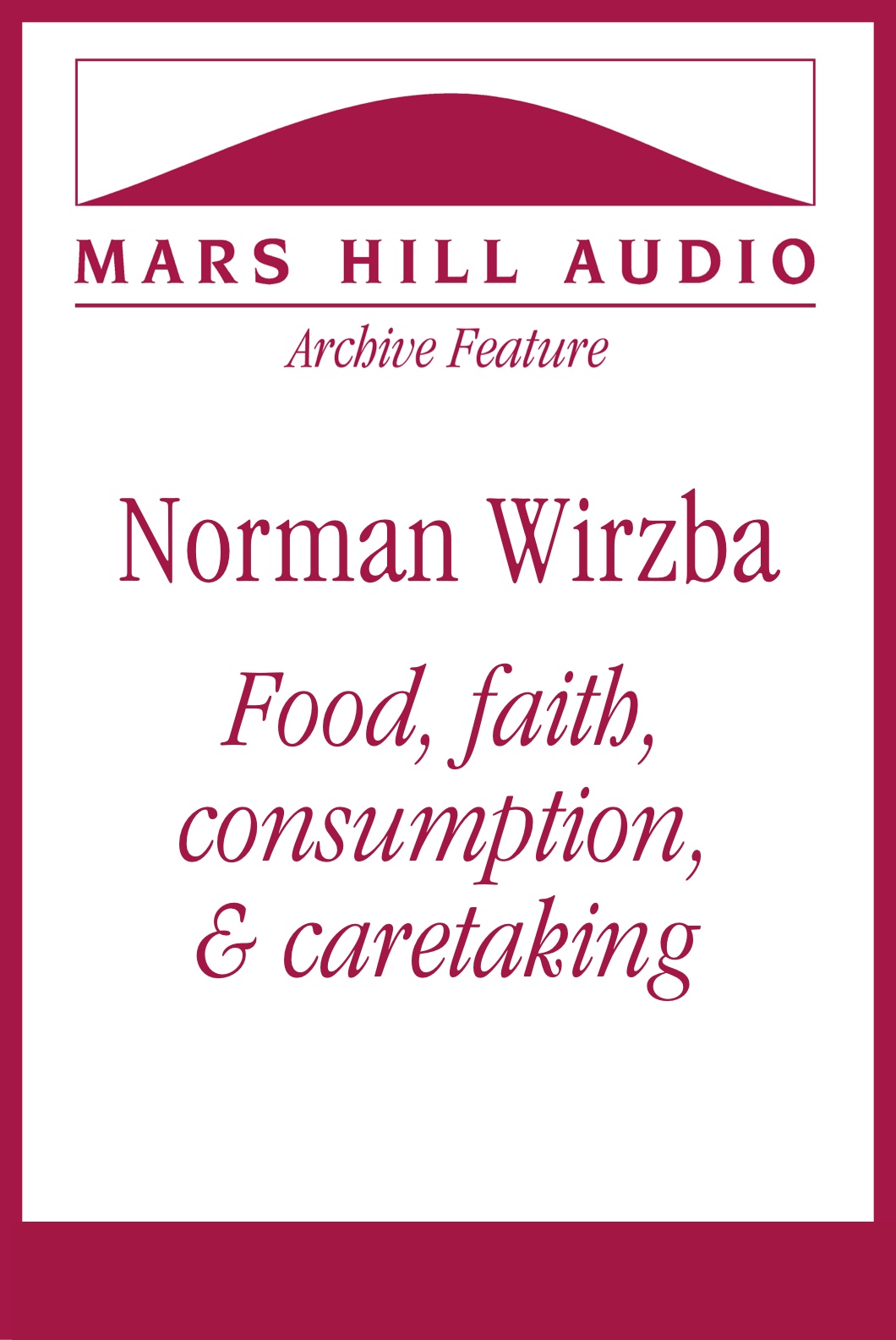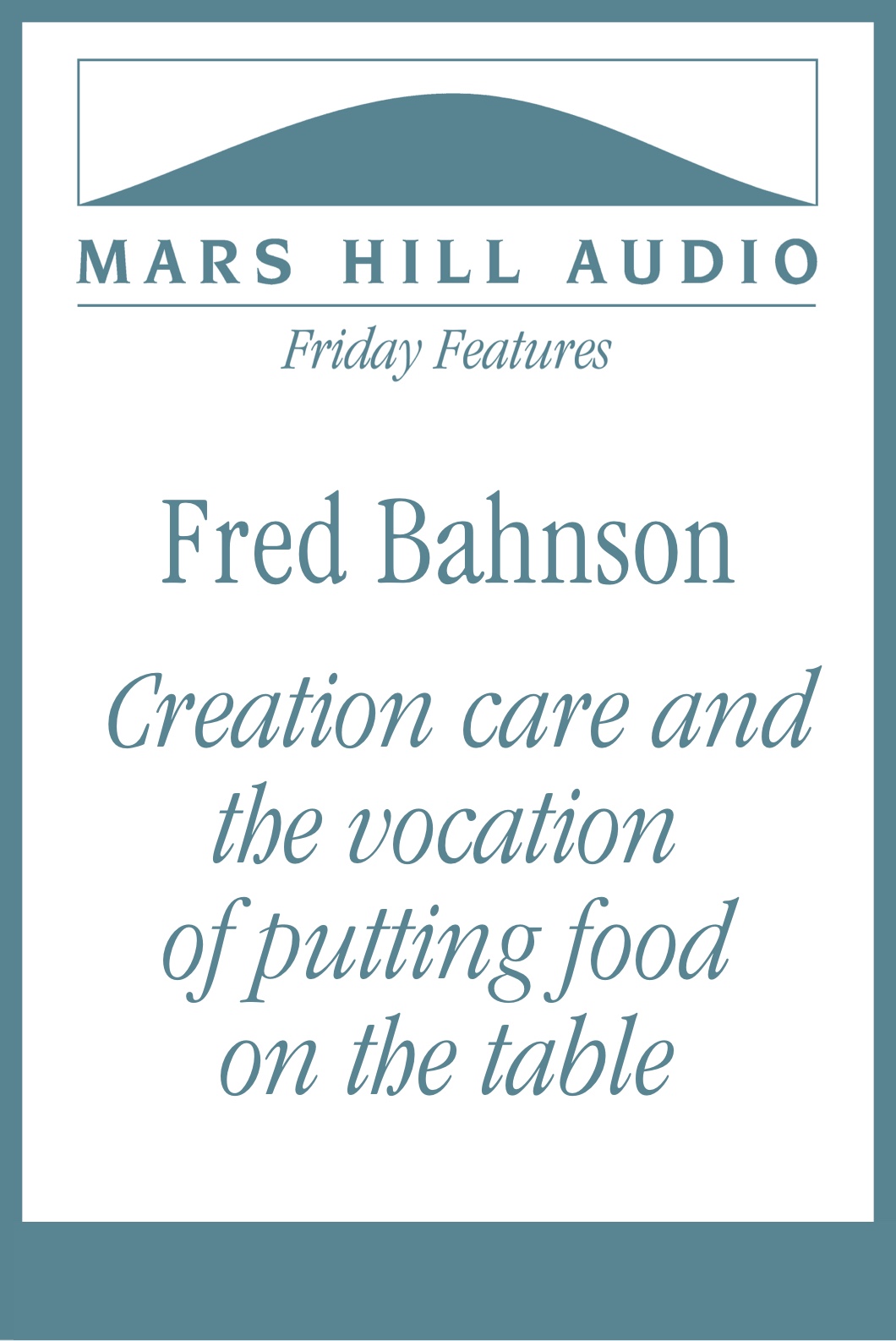originally published 3/1/2012
Theologian Norman Wirzba examines the relationship between food and faith. He begins by discussing the changes in the meaning of the word “culture” in the past two centuries: from expressing the link one has to the land and the process of deriving one’s life from that land with its other inhabitants, to expressing an individual’s consumption of products divorced from their earthly origins. That is, consumption in the modern world is increasingly distanced from the myriad processes that generate the goods to be consumed. Bread, for example, is reliant on many communities and cultural practices for it to be made and enjoyed. Eating depends on life and death in the world in profound ways, and modern practices can obscure the connections and significance of this truth. Wirzba turns to Genesis 2 to describe human interdependence with the very soil of Creation and man’s vocation as caretakers of the garden and of the animals originally presented to Adam. Rather than working out that vocation, he believes modern people have given themselves over to the idols of control, efficiency and convenience and created institutional structures and systems in the image of those idols that, ironically, undermine life.
24 minutes
PREVIEW
The player for the full version of this Feature is only available to current members. If you have an active membership, log in here. If you’d like to become a member — with access to all our audio programs — sign up here.
More to hear . . .
In 2012, Ken Myers interviewed Fred Bahnson, co-author (with Norman Wirzba) of Making Peace with the Land: God’s Call to Reconcile with Creation (InterVarsity Press). Today’s Feature is an extended cut of that conversation, in which Bahnson describes how (in the words of his book) “when we garden well, we do not only grow food for our bodies and flowers for our tables; we share in and extend God’s feeding, healing, and sustaining ways with the world.”
Related reading and listening
- The recovery of an integrated ecology — In this essay, Michael Hanby unpacks the summons of Laudato si’ to an ecological way of life based on a proper understanding of creation in its fullness and integrity. (57 minutes)
- Speaking the word in love — In this lecture, D. C. Schindler examines core insights from Ferdinand Ulrich on the central vocation of man and the meaning of being. (32 minutes)
- Music, silence, and the order of Creation — In this lecture, Ken Myers explains how it is that our participation in harmonic beauty in music is a kind of participation in the life of God, in Whom all order and beauty coheres and is sustained. (61 minutes)
- The gift of liturgical time — In this lecture, Gregory Wilbur explains how liturgy and liturgical time align us to the rhythms and order of Creation, forming us as disciples. (45 minutes)
- The confident optimism in true Christian asceticism — Philosopher Étienne Gilson on the essential goodness of Creation
- Festivity and the goodness of Creation — Drawing on Josef Pieper’s ideas, Ken Myers explains why the spirit of festivity is the spirit of worship, and that “entertainment” is ultimately an artificial, contrived, and empty effort to achieve festivity. (25 minutes)
- Forms as portals to reality — Ken Myers explains the ancient classical and Christian view that music embodies an order and forms that correspond to the whole of created reality, in its transcendence and materiality. (54 minutes)
- Creation’s goodness and human faithfulness — J. Matthew Bonzo and Michael R. Stevens on Wendell Berry’s understanding of how Creation is a gift with certain givenness
- Productivity or thrift? — Wendell Berry contrasts an economy of productivity (which invites extravagance) and an economy of thrift (which takes care of things)
- The destructive logic of short-term thinking — Wendell Berry on the perils of ignoring the nature of Nature
- Farming and our primal vocation — Shawn and Beth Dougherty make a theological case for biomimicry, or fulfilling our original vocation of tending the earth by working according to the nature of Nature. (68 minutes)
- Honoring the pigness of pigs — FROM VOL. 137 Popular innovator and speaker on farming practices Joel Salatin talks about the challenges of caring for Creation within an agricultural and food system that pays little attention to the purposes and inclinations of Creation. (25 minutes)
- An account of God’s relatedness to time and space — Colin Gunton on the trinitarian conception of the divine economy in St. Irenaeus
- What does it mean to be a creature? — Canon-theologian Simon Oliver explains how and why the doctrine of Creation is cardinal and must frame all theology. (62 minutes)
- “Reading Lewis with blinders on” — Chris Armstrong explains how C. S. Lewis’s work is grounded deeply in the Christian humanist tradition. (45 minutes)
- The unintended consequences of the Reformation — FROM VOL. 114 Historian Brad Gregory discusses the unintended consequences of the Reformation, consequences which continue to trouble us. (26 minutes)
- Creation as beauty and gift — FROM VOL. 67 David Bentley Hart describes how the Christian understanding of Creation as beauty and gift, as the outward expression of the delight the Trinity has in itself, reveals a vision of reality different from the pagan or fatalist vision of reality. (12 minutes)
- The Life was the Light of men — In a lecture from 2018, Ken Myers contrasts the Enlightenment’s understanding of reason with the Christocentric conception of reason. (57 minutes)
- Discerning an alternative modernity — In a lecture from 2019, Simon Oliver presents a summary of the cultural consequences of the comprehensiveness of the work of Christ. (28 minutes)
- Lessons from Leviticus — The book of Leviticus may be assumed to be irrelevant for charting a way through the challenges of modernity. Theologian Peter J. Leithart disagrees. (22 minutes)
- A theology of active beauty — In a 2010 lecture, George Marsden examines a few ways in which the distorting effects of Enlightenment rationalism were resisted in the work of Jonathan Edwards. (64 minutes)
- Mars Hill Audio Journal, Volume 161 — FEATURED GUESTS: Andrew Wilson, Kyle Edward Williams, Andrew James Spencer, Landon Loftin, Esther Lightcap Meek, Andrew Davison
- Wirzba, Norman — FROM THE GUEST PAGE: Norman Wirzba pursues research and teaching interests at the intersections of theology, philosophy, ecology, and agrarian and environmental studies.
- Understanding the doctrine of participation — FROM VOL. 150Theologian and priest Andrew Davison believes that retrieving the historic doctrine of participation is vital to help Christians escape from the default philosophy of the age. (32 minutes)
- On Earth as it is in Heaven — FROM VOL. 108Hans Boersma — author of Heavenly Participation: The Weaving of a Sacramental Tapestry — explains why Christians should reject the modern separation of Heaven and Earth and recover a “sacramental ontology.” (26 minutes)
- Mars Hill Audio Journal, Volume 158 — FEATURED GUESTS:
David Setran, Vigen Guroian, Michael Dominic Taylor, Thomas Pfau, Jason Paone, and Matthew Levering
- Lilies as analogues for farming — Fred Bahnson on the wisdom of attending to patterns of Creation
- Making peace with the land — Fred Bahnson challenges us to consider how we might honor our created and redeemed relationship with the earth as God’s stewards. (48 minutes)
- Learning to see the world aright — Norman Wirzba on cultivating a Christocentric vision of Creation
- Mars Hill Audio Journal, Volume 157 — FEATURED GUESTS:
Allan C. Carlson, Matthew Stewart, Steven Knepper, Holly Ordway, Norm Klassen, and Norman Wirzba
- This world is now my home — Belden Lane describes several approaches to understanding how we experience the sacredness of earthly places and how we learn to see God manifest in His Creation. (48 minutes)
- Breaking out of the immanent frame — Norman Wirzba on the true character of Creation and of our creatureliness
- Living in a meshwork world — Theologian Norma Wirzba believes that Creation is the “material manifestation of God’s love” and that this fundamental teaching affects everything, especially our understanding of the meaning of modern environmental crises and climate change. (17 minutes)
- Mars Hill Audio Journal, Volume 154 — FEATURED GUESTS:
Felicia Wu Song, Michael Ward, Norman Wirzba, Carl Trueman, D. C. Schindler, and Kerry McCarthy
- For the beauty of the earth — Dietrich von Hildebrand on how the love of God deepens our love for the beauty found in Creation
- In the house of Tom Bombadil — C. R. Wiley explores the mysterious, “allusive” figure of Tom Bombadil in J. R. R. Tolkien’s Lord of the Rings. (17 minutes)
- Sneaking past watchful dragons — Junius Johnson describes how Hans Urs von Balthasar’s understanding of Creation resonates with that of C. S. Lewis and Bonaventure, all three of whom served as mentors in his thinking about beauty. (18 minutes)
- Our commerce, our selves — Thomas Frank argues that the anti-establishment ethos of the counterculture was not a new phenomenon in the 1960s but was already present in corporate America long before the Beatles showed up. (23 minutes)
- Don’t feel bad — James Twitchell discusses a few of the themes in his book about the confusing state of the evolution of shame and shamelessness. (20 minutes)
- Desire desires desire — Zygmunt Bauman on being a consumer in a consumer society
- Faith born of wonder — Theologian Andrew Davison echoes a theme in the work of G. K. Chesterton, describing the work of apologetics as awakening a sense of wonder in the reality of Creation as a beautiful gift. (23 minutes)
- Beer brewing and monasticism — Fr. Andrew Bushell talks about why and how he became a brewer and about the intertwined history of brewing and monasticism. (28 minutes)
- Confronting modernity through farming — Jesse Straight, who nurtures the life of Whiffletree Farm in Warrenton, Virginia, talks about how he decided to pursue a vocation as a farmer in an effort to discover a way of life that worked against the characteristic fragmentation so dispiriting in modern culture. (24 minutes)
- Why “Creation” is more than “origins” — In this archive interview from Volume 121 of the Journal, Michael Hanby talks about why we shouldn’t assume that science can ever be philosophically and theologically neutral. (32 minutes)
- Creation, natural law, and ecological concerns — Christopher Thompson discusses our need to grow in wisdom and humility, that we might flourish in this ordered cosmos in which we live. (16 minutes)
- St. Thomas and the wisdom of Creation — Christopher Thompson offers a renewed vision of “the human person [as] an embodied, spiritual creature dwelling in a cosmos of created natures, intelligently ordered by God and capable of being intelligibly grasped by human reason.” (16 minutes)
- Hans Boersma on For the Life of the World — Drawing from Alexander Schmemann’s book, Hans Boersma asserts that a recovered understanding of the relationship between God and Creation is essential to addressing a host of modern cultural crises. (17 minutes)
- Mars Hill Audio Journal, Volume 139 — FEATURED GUESTS:
W. Bradford Littlejohn, Simon Oliver, Matthew Levering, Esther Lightcap Meek, Paul Tyson, and David Fagerberg
- What they saw in America — Sociologist James Nolan describes the perception of American culture of four distinguished foreign travelers: Alexis de Tocqueville, Max Weber, G. K. Chesterton, and Sayyid Qutb. (5 minutes)
- Mars Hill Audio Journal, Volume 137 — FEATURED GUESTS:
Gilbert Meilaender, James L. Nolan, Joel Salatin, Michael Di Fuccia, Robin Leaver, and Michael Marissen

